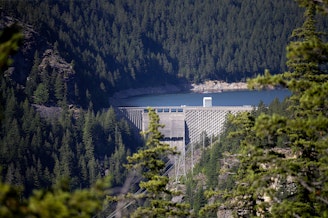Baby bison euthanized after being handled by a Yellowstone guest, rejected by herd

Yellowstone National Park rangers euthanized a newborn bison calf after a visitor touched the animal, trying to help it catch up with its herd, the National Park Service said on Tuesday.
The herd had been crossing the Lamar River on Saturday evening when the calf got separated from its mother on the river bank, according to a press release from the agency. A man observing the scene approached the animal with apparent rescue intentions.
"As the calf struggled, the man pushed the calf up from the river and onto the roadway," NPS said. "Visitors later observed the calf walk up to and follow cars and people."
Park rangers repeatedly tried to reunite the calf with the herd, but the herd resisted.
The rangers later euthanized the calf, saying its persistence in approaching cars posed a hazard to guests, according to NPS.
Sponsored
NPS is investigating the incident and asking the public to share any relevant information to a tip line. The agency has yet to identify the man behind the incident, describing him as a "white male in his 40-50's, wearing a blue shirt and black pants."
Yellowstone requires that visitors stay at least 25 yards away from its two breeding bison herds, which collectively contained 5,900 animals at the last count in 2022. The park is the only place in the contiguous U.S. to have maintained a continuously free-ranging bison population since prehistoric times.
Yellowstone's herds were nearly poached to extinction in the late 1800s. Today, park guests can spot the animals nearly year-round and from the roadway in places like Wyoming's Lamar Valley, a confluence of rivers in the park's northeast corner.
NPS has frequently defended its policy of not interfering in the natural death of animals on public lands, including orphaned offspring.
"Our focus is on sustaining viable populations of native wildlife species, rather than protecting individual animals," reads an NPS webpage on the policy. "An animal's survival depends on its own daily decisions and natural selection."
Sponsored
NPS did not immediately respond to NPR's inquiry as to whether the man could face charges for handling the animal. [Copyright 2023 NPR]



